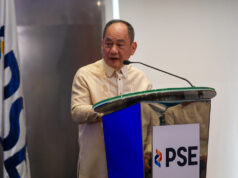How to solve the waste plastic problem one ‘ecobrick’ at a time
By Vincent Mariel P. Galang
A BULACAN-based company is using waste plastic laminates or sachets to produce “ecobricks,” which are touted as a solution to the solid waste problem and a “green” alternative to hollow blocks.
Green Antz Builders, Inc., a social enterprise in Plaridel, is producing ecobricks which are now being used by local government units, schools, and companies.
Green Antz founder and CEO Rommel B. Benig started the company in 2013 with the idea of using waste plastic laminates in making ecobricks.
With support from his former employer Nestle Philippines, Green Antz developed the ecobricks as “aesthetically superior, stronger, and cost-effective” than regular hollow blocks, and at the same time, addressing the solid waste management problem.
“While we are slowly making ‘yung mga structures na ‘to [these structures], we are making our green story together with Nestle,” Mr. Benig told BusinessWorld.
Unlike hollow blocks which are made through molding, the production of ecobricks uses compression. It also undergoes a propriety process, and its formulation uses a special construction additive that makes it stronger.
“Conventional thinking will tell us that cement and plastic do not adhere to each other, but because we are using a special construction additive, we are able to get a stronger product…. That is also key for us to replicate the same quality in different locations,” Mr. Benig added.
Mr. Benig said he wants to expand the business around the country through a social franchising model. This is similar to commercial franchising but does not involve any royalties.
“When we partner with a company, it sponsors the funding and together we identify a beneficiary which will manage the operation of a Green Antz Hub with Green Antz overseeing it,” he said.
WORKING WITH NESTLE
Having Nestle Philippines’ support has helped create awareness and demand for Green Antz’s products, especially among other companies.
“You have to create a demand for the product, and knowing that Nestle is bigger company than Green Antz… So, I can refer the products of Green Antz to other customers, other potential people who can get the products,” Jess G. Reyes, Nestle vice president for corporate affairs, told BusinessWorld.
Green Antz supplied ecobricks for a Nestle Philippines facility in Lipa City. Completed in 2015, the 100-square meter multi-purpose building used 3,500 ecobricks.
Aside from Nestle, Green Antz’s corporate partners include Aboitiz Power Corp., Republic Cement, Hope in a Bottle, Ayala Land Inc., Pilipinas Shell, and Ten Knots in El Nido.
COLLECTING SACHETS
At the same time, the company has teamed up with local government units, cooperatives, schools, and communities. Green Antz collects sachets and other plastic laminates which are then exchanged for ecobricks. With two and a half kilos of plastic sachets, you can get one ecobrick.
In Plaridel, the Culianin Elementary School was able to build a clock tower using ecobricks after turning over 1,250 kilos of plastics, a pathway from 2,500 kilos of plastics, and a school canteen from 5,000 kilos of waste.
Green Antz also collaborated with the municipality of Plaridel, which allows constituents to pay for services in the form of discarded plastic bottles, sachets and laminates. The plastic waste is then used to manufacture construction materials to build day care centers and classrooms in Plaridel.
The company has also started sending representatives to Marawi to teach communities about waste collection and ecobrick production.
“We want to be part of the Build, Build, Build campaign…. We want that idea kasi as we build, build, build, we clean, clean, clean,” Mr. Benig said.
Aside from ecobricks, Green Antz also produces eco-pavers or pervious pavers for pathways, and eco-casts or hollow block-size pre-cast for building fences.
Green Antz currently has ecobrick manufacturing hubs in Pulilan and Plaridel in Bulacan, Bacoor in Cavite, Teresa in Rizal, and Cebu. It also has partners in Batangas, in Catanduanes, Legaspi, Tabaco and Naga in the Bicol region, Vigan in Ilocos Sur, and El Nido in Palawan.
For next year, the company is looking at establishing 24-30 more ecobrick manufacturing hubs.
“We want to be present in every city, every municipality in the country, so that we replicate the model that we have started here in Bulacan. Empowering communities, building sustainable and environmentally responsible communities, and after building green colonies in the country, we want to be present outside the Philippines as well,” Mr. Benig said.



